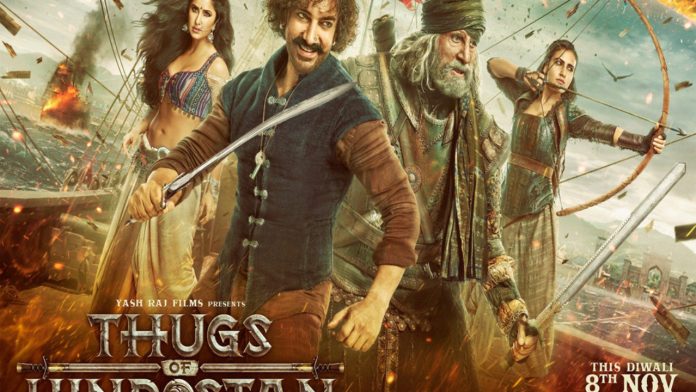By Surendra Bhatia
Stardom Woes
Stars change. Some may move slowly but there’s no pause; nothing is static. For instance, Saturn takes almost 29-30 years to go round and come around, and Jupiter, 12 years, and Moon, only a month, but nothing stops, ever. It’s not in the nature to pause.
It might have seemed to many in Bollywood that the clock had stopped after the reign of superstar Amitabh Bachchan ended and the precious superstardom passed on to the three Khans – Aamir, Salman and Shah Rukh. But all around the Khans, many contenders surfaced and disappeared, even as the Golden Trio, at their peak since over two decades, went through minor troughs at times but stayed steady, sailing through from one crest to another. Sure, occasionally, doomsayers have written each one’s obituary after an unexpected flop but they have always been proved wrong, till now. Has the time now come? Are stars up to some tricks, making a dash from these to others, younger, brighter and more suited to a longer run?
The Khans aren’t going anywhere soon but the obituaries have begun surfacing, again. Shah Rukh has been going through a dreadful time at the box-office and is believed to have hit an identity crisis, unable to fathom what kind of films he should sign. Sensibly, he has decided to take a break (one month, one year, two…?) till he can design a strategy to stage some kind of a comeback. Aamir has had only one blot in recent times – Thugs Of Hindostan – and he seems to have the ability to grow, at will, younger for a role; so, he’s still got a long way to go before anybody thinks of him as a has-been.
Salman Khan’s Bharat was an eye-opener. The superstar bhai has lost none of his fan base. The film released on Eid, as one-a-year Salman film usually does, and the hordes just came pouring into cinemas like there was no tomorrow. The very first day racked up ticket sales of over Rs. 40 crore, which is fabulous by any standards. On the basis of the opening day, Bharat was already a Rs. 300-crore film… it just had to go through the motions for a certain number of days, or so the industry thought.
But the box-office fate of Bharat wasn’t as simple as that. The film held sway through the Eid festival and the weekend, pulling in over Rs. 140 crore in five days, which was not bad at all. But the Monday after the release was a revelation. The film collections dropped from around Rs. 27 crore on the 5th day (Sunday) to around Rs. 9 crore on Monday! There’s no surprise that box-office collections would ease off after the weekend but such a drastic drop was startling. Collections on Monday ought to have been in the region of about Rs. 12-14 crore, given that the Eid and weekend collections were better than average, and also that it is a much-awaited film of a superstar that should continue to show life after the opening weekend too. But the fall on Monday was soon overshadowed by a further drop on Tuesday, by which time the eyebrows in Bollywood were raised and it was understood clearly that Bharat was not a Rs. 300-crore movie, as was earlier assumed. In fact, it became obvious that Salman’s latest release would struggle towards the mark of Rs. 200 crore and would be lucky if it got there.
Actually, the undercurrent among audiences was discernible even on the opening day, except that in face of good collections, no one wanted to notice it. Bhai was getting his fans enthusiastically queuing up for tickets but the ones emerging from cinemas after the screening didn’t look so thrilled. The film was okay, audiences said, or actually, less than okay, but since Bharat is a Salman film and released on Eid, the faithful just kept coming in. Salman, for whatever he is – overweight and built more like a wrestler now than the slim hero he was a decade back – is still a superstar with a huge fan following. As long as the film is not an outright fraud on the public the way Tubelight was, Salman can drag it with good houses till the last show of the weekend. And his fans put their weight behind him too. But Monday is always another story. Bharat, not in the same category of entertainment as Sultan, was, nevertheless, far better than Tubelight, and that made the superstar’s task easier.
Salman’s stardom is visible in the remarkable 5-day opening weekend collections; the problem is, Bharat has not lived up to expectations of Salman’s fans and others in the audience. Salman did what a superstar is expected to do, bring in the crowds; he failed as an actor in his choice of subject… Bharat just didn’t work too well as a film.
But that is only a small jigsaw piece in a larger puzzle. Salman’s Tubelight too proved to be a poor choice of subject, and Race 3 was hardly any better. Both didn’t add anything to Salman’s reputation as a superstar. Bharat is the third piece of a puzzle that will become more and more complicated as Salman’s next few films come in. Shah Rukh is in much the same situation, only slightly worse. His last few films have been, in rather impolite terms, rejected by audiences. Fan, Jab Harry Met Sejal, Zero… what were those and what was Shah Rukh doing in them?
Salman and Shah Rukh are being done in not by their acting skills or screen presence but their poor choice of subjects. Even Aamir, who has had a spate of hugely successful films in the last two decades, was felled finally by a poorly-scripted film: Thugs Of Hindostan. Considering that Aamir’s last few films – Dangal and 3 Idiots – are considered among the best Indian cinema has produced in many years, his choice of Thugs Of Hindostan was pathetic, uncalled for, many thought, with the advantage of hindsight. But at least for Aamir, that flop was an aberration; with Salman and Shah Rukh, it seems to have become a norm.
It’s never easy to pin down a story and then ensure that each element in the screenplay is balanced just right to give it that sense of credibility, plausibility and yet keep the proceedings entertaining. It’s a very tough job and that is reflected in the small percentage of films that succeed in almost every film industry in the world. To add to that very difficult task, it is even more complex writing a film for a superstar. His stardom can’t be ignored and yet weaving it into his character’s personality without affecting the story calls for writing skills not easily available in Bollywood. Salman and Shah Rukh are caught in that ever-tightening web where, in their orbit, there don’t seem to be any stories that do them justice. Aamir, in that sense, scores over them by focusing primarily on the story he likes, and then adjusting himself into the role. For instance, the role of Taare Zameen Par was never meant for him. Aamir is and was a superstar at the time he heard the narration of Taare Zameen Par. The role was of an ordinary teacher who, to pile insult to injury, makes a late appearance in the film. Also, the main role was that of a child actor, and children are notorious scene stealers. If the teacher overshadowed the child, the film would collapse; and with Aamir acting in the film, how could the focus be on another actor, especially an unknown child actor? These were impossible conditions but Aamir decided that he would not only play the teacher’s role but also produce and direct the film. It is to his credit that he didn’t let his stardom override either his own role or the child actor’s character. He merged into his role, underplaying, understated and let the child own the film. It might not seem difficult but one has to remember that Aamir also had to worry about his fans being disappointed at seeing so little of him and in such an ordinary role. He pulled it off as only he can.
Aamir could do it because he shed his stardom and became an ordinary actor, and kept the scale of the film in line with the demands of the story and not his star presence. Either Salman and Shah Rukh are just not able to do that or they don’t come across such stories or they come across them and don’t like them. Actually, that is not strictly true. Shah Rukh did it once and did it spectacularly, if he remembers it at all. What Aamir did in Taare Zameen Par, Shah Rukh did in Chak De! India. He played his role of a hockey coach as straight as he could, with no star mannerisms, and he let the unknown girls in hockey players’ characters dominate the film. He had his moments, of course, just as Aamir had them in Taare Zameen Par but Shah Rukh left his stardom in the locker. Chak De! India is one of Shah Rukh’s most memorable films but, possibly, he doesn’t quite see it that way because his role was of an ordinary person and the scale of the movie was small.
Salman and Shah Rukh have much left in them, certainly enough to keep them going for another half decade. But they need to make a choice now: whether to keep searching for stardom roles or to get into interesting roles and make them memorable. Or maybe that is not their dilemma at all. Last heard, Shah Rukh wants to line up Don 3 to bring him back that stardom, and Salman is eyeing Dabangg 3 to hit the bull’s eye with a little more certainty.
Stars change, stardom doesn’t. It just provokes its devotee to try harder at doing what he’s done successfully before, only a little harder. That’s how caricatures are born, from stars who try so hard and so consciously to repeat what they had done in their younger days that they end up as unflattering imitations of themselves. It’s happened before, even with a great like Amitabh Bachchan. Hopefully, Salman and Shah Rukh won’t go down that route. They do deserve better.
Original Promotes
The Remake!
Often, filmmakers try to keep secret the original movie which they are remaking. Their obvious fear is that if people catch the original film (regional, Hollywood), there would be less reason for them to check out the remake. That may be true but at times, the original movie can also become the best way to promote the remake. At least, that’s how things seem to be panning out for Kabir Singh.
Despite starring Shahid Kapoor, Kabir Singh was turning out to be a low-profile property till people caught on that it is the remake of the Telugu Arjun Reddy, a huge hit. The feedback on Arjun Reddy was so positive that people began to watch it (with subtitles available). The remake, therefore, began to be viewed as a potential super-hit. People felt, if the original is such a fabulous movie, the remake just has to be worth more than a one-time watch. This has drummed up a wave of expectations for Kabir Singh, which earlier were quite muted.
This isn’t a new phenomenon. Decades back, Mahesh Bhatt took great pride in proclaiming that his underproduction film, Dil Hai Ke Manta Nahi, was a ‘frame-to-frame copy’ of Hollywood film It Happened One Night, and much more so than the earlier remake, Chori Chori starring Raj Kapoor and Nargis. While serious followers of cinema in Bollywood were aghast at Bhatt’s pride in plagiarising, audiences’ interest peaked by the time of release and Dil Hai Ke… turned out to be a runaway hit.
Hopefully, Kabir Singh will receive a similar reception at the box-office. Probably, what matters most to audiences is the film they are watching and not its pedigree, but it does help to know a little of what to expect. In such cases, the original could well turn out to be the best advertisement for the remake.































